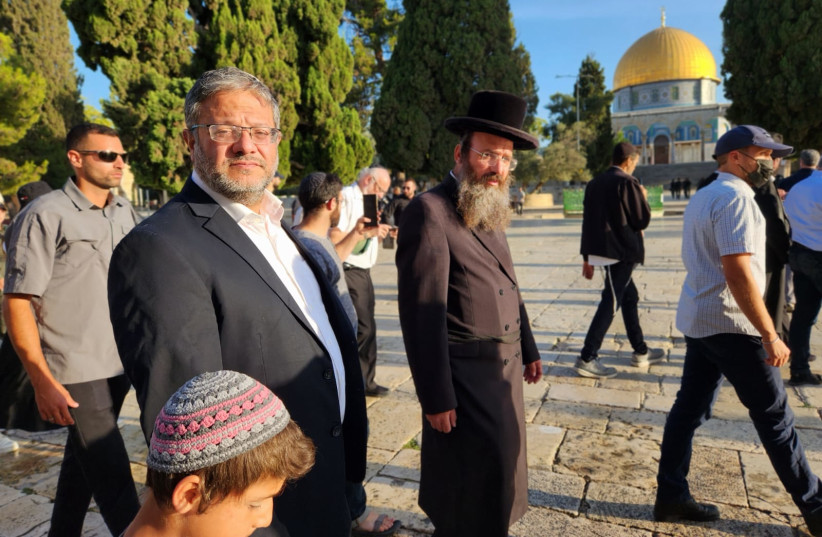Thousands of Jewish visitors are expected to visit the Temple Mount during the Sukkot holiday, the Temple Mount Administration said Friday.
During Rosh Hashanah and Yom Kippur, the number of Jewish visitors jumped by 20% compared to last year. The Temple Mount Administration stated that due to the increase in visitors, many visitors are expected during Sukkot as well.
The administration added that the sharp increase in Jewish visitors is due to the quiet conditions at the site after Arab rioters were distanced from the site during the holidays. The administration praised the police for creating calm conditions for Jewish visitors during the holidays.
A sukkah has been set up at the entrance to the Temple Mount so that visitors will be able to enjoy refreshments while waiting to enter the site. During the holidays, there are often long lines at the entrance as a limited amount of people are allowed to go up at a time.
According to the Administration, the police are preparing to allow multiple groups to enter the site at the same time in order to lessen the waiting time for visitors.

The Temple Mount will be open to Jewish visitors Sunday to Friday from 7-11:30 a.m. and from 1:30-2:30 p.m. The Temple Mount is not open to Jews on Fridays and Saturdays.
The Administration stressed that large numbers of people are expected during the first two hours of the morning visiting times and recommended that people wait to go after 9 a.m.
The Administration referenced recent incidents of visitors being arrested after prostrating and blowing the shofar, insisting that despite the isolated arrests, the police treat all visitors with courtesy and tolerance.
"The high-profile arrests are a recurring phenomenon of activists challenging the government's rules on the Temple Mount head-on in front of the police officers who themselves are pained by the rules they are required to enforce," said the Administration.
Jewish visitors to the Temple Mount are informed upon entry that prayer and religious items such as prayer books or prayer shawls are forbidden in the complex, although, since late 2019, Jewish visitors have been able to pray quietly, including the Priestly Blessing, in certain parts of the site, relatively undisturbed.
Since early last year, there have been occasions on which Jewish visitors have succeeded in praying and singing out loud and even managed to raise Israeli flags, although many of these individuals were subsequently arrested.
While the High Court of Justice has ruled in the past that Jews do have the legal right to pray on the Temple Mount, police have cited security concerns to impose a blanket prohibition on Jewish prayer, although they have decreased the enforcement of that prohibition since 2019.
In May, National Security Minister Itamar Ben-Gvir stated that the government was making changes on the Temple Mount "slowly and quietly," during a festive meal for Jerusalem Day hosted by the Temple Mount Administration.
Hamas warns against 'harm' to al-Aqsa
On Friday, Hamas official Mushir al-Masri warned that "Israel's conspiracies will not pass through al-Aqsa Mosque, and our people will not allow it to affect the Islamic nature of al-Aqsa."
"Al-Aqsa Mosque will remain the focus of conflict, the bomb of revolutions, and the destination of our people and nation," added Masri, stressing that any harm to the mosque would "add fuel to the fire."
Additionally on Friday, the Lebanese al-Akhbar newspaper reported citing unnamed sources that Hamas ended the riots on the border on condition that there be no "escalation" at al-Aqsa and in Jerusalem, as well as for a number of economic concessions, including more entry permits.
